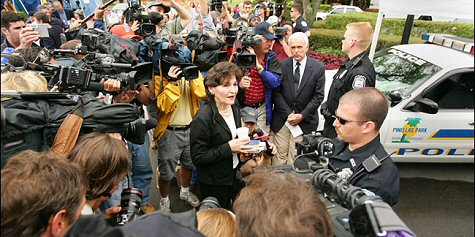If you have any kind of feelings about wine and the art of making it, or just the pleasures of taking small little slurps of the stuff, Mondovino (Thinkfilm, opening today) is two things: essential viewing and a delightful education.
You’ve probably heard it has a contentious side. A recent New York Times piece began, “If you want to start a fight, mention Mondovino to people in the wine business and step back.”

Jonathan Nossiter (in white) in Sardinia during filming of Mondovino.
The basic thrust of this longish (135 minute) documentary is that the wine-making world is becoming more and more homogenized and marketing-driven, and that global commerce is diluting the poignance and particularity of local cultures.
Like, duhhh.
Mondovino is a tiny bit sloppy and unfair…okay. It doesn’t put forth an all-seeing, carefully balanced vision of things, but the political agenda of Jonathan Nossiter, a filmmaker (Sunday, Signs and Wonders) who began working in restaurants when he was 15 and has clearly formed some sharp opinions about this world.
Nonetheless I am astonished — staggered — that there are cultivated wine professionals out there who are taking issue with his basic thesis.
Please….worldwide commerce and international branding (i.e., the super-global McDonald’s/Walmart/Starbucks effect) has been polluting the native purity of local culture everywhere for decades. Is it any surprise to anyone that the same thing, more or less, is manifesting in the wine world? People are debating this?
Mondovino is a hand-held, jerky-camera, seemingly thorough primer about the bad guys and good guys in the conflict.
The bad guys are, of course, bold and rich and into making more and more wines taste the same while driving up prices of the more highly coveted vintages.

Michael Mondavi (l.) and father Robert Mondavi during interview scene in Mondovino.
The Napa-based Robert Mondavi Corporation (fronted by sons Tim and Michael, pater familias Robert) absorb most of the scorn, along with Michel Rolland, a charming international consultant who keeps telling his clients to micro-oxygenate their wines. He may be a prick at heart, but this is hard to fully accept since he has such a great laugh and seems so amiable and self-mocking.
I know this: the Mondavi’s have an upscale division called Opus One, and a few years ago they became joint owners of one of the hottest Tuscany wines, Ornellaia, along with the founding Frescobaldi family. A Los Angeles wine specialist tells me that since this happened in ’02, the price of a bottle of Ornellaia has roughly doubled.
The good guys — the “resistance,” as American wine importer Neal Rosenthal calls them — are more invested in the soul and tradition of wine than just the selling of it. Instead of branding their rallying cry is terroir, a French term that basically means “land” but also alludes, obviously, to life’s deeper, longer lasting aspects.
Nossiter, at heart a bit of a socialist and apparently a Reagan-Bush hater (how could he not be?), feels that countries should protect their wines by declaring them part of their “cultural patrimony.”
“It’s the only chance for wine’s survival [because] it has to be considered something sacred,” he recently declared. “It is a sacred relationship with our cultural past…it is a living museum.”

“What is happening to wine today is as outrageous as if we tolerated people going into MOMA and retouching all the colours of Picasso’s ‘Les Demoiselles d’Avignon’ with acrylic just because it’ll be a little shinier and brighter and easier for the public to understand,” he said.
I’m such a wine plebian you could probably blindfold me and get me to taste one of Rolland’s micro-oxygenated wines and then a glass of Ornellaia out of an $80 or $90 dollar bottle, and I might not know the difference.
I am, however, basically against the idea of big guys throwing their weight around, and I believe the maxim that “when you have wine you have civilization,” and that small-scale artisans will always be better at nurturing culture than guys with huge swaggering bank accounts, so I’m naturally inclined to accept what Nossiter is saying…although I don’t dispute the argument that he’s dealing from a stacked deck, to some extent.
Robert Parker, probably the most influential wine critic in the world, is interviewed by Nossiter at his home near Baltimore. He is portrayed with relative fairness, it seems, and comes off as a bright, self-made, well-spoken sort. But because Nossiter goes after Rolland, whom Parker is friendly with and whose wines Parker approves of, Parker has accused Mondovino of “lying, distorting, misrepresenting and intentionally perverting people’s points of view.”
Maybe Parker got angry that Rossiter was trying to make a point by cutting back and forth between him and his English bulldog (one of those ugly guys with the teeth sticking out). We are our dogs, right? Rossiter also shows us that Parker has an FBI hat in his office along with a signed portrait from Ronald Reagan on his wall.
(Parker has a great listing of wine glossary terms on his website, by the way. I look at it every so often as part of my never-ending quest to broaden my vocabulary.)

One of the results of big guys having more and more control over an industry is that the smaller guys sometimes have trouble getting distributed.
Case in point: an inexpensive Sicilian table wine I used to like called Corvo Bianco. I first tried it after watching Ben Kingsley and Jeremy Irons throw down glass after glass during a scene in Betrayal (1983). It was buyable in this and that L.A. wine store during the ’80s, but I haven’t seen it around in well over a decade. (Has anyone?)
Nossiter has said that “where goes wine, goes the world” and that “people who go to see Mondovino are not necessarily wine people. It’s for people who never even imagined that wine was important to their lives.”
“The film provokes the notion that wine is linked to your life whether you drink it or not, and it’s an expression of the world you live in. The threat to the identity of wine is a threat to all of us.”
He also recently told a Reuters reporter that his documentary “is no feel-good wine film.” I disagree. I’ve seen Mondovino twice now and really enjoyed it both times.
For me it’s an earthy, nourishing travel flick about good people, lovely vineyards and quality-of-life issues. It’s about hanging with lots of very cool, cultivated winemakers in Burgundy, Bordeaux, Tuscany, Napa Valley, etc. I love the moods, aromas, bouquets. It made me miss Italy so much it hurt. It basically leaves you in a nice place.
I think it’s fair to say Nossiter has a dog fixation. The ratio of barking and panting to sipping and sniffing in this film is about ten to one. Every time he visits someone new, the camera goes right to the dog and then keeps cutting back to it.

Jonathan Nossiter during L.A. hotel room interview at Le Meridien.
I’m trying to lose at least 20 pounds on a diet of salmon, pineapple chunks, Lemon Diet Coke, fruit juice, energy bars and celery stalks, and I’ve also given up wine. I’m glad I’m doing this, but cutting wine out of my life hasn’t been very good for my personality. If I were told I couldn’t have another beer for the rest of my life, I would live…but not vino.
An expanded Mondovino will be offered as a ten-part, ten-hour DVD series next Christmas. It may feel a bit unwieldy to some, but at least it’s shorter than it was when it was shown in Cannes `04, when it was close to three hours long. That doesn’t seem so long when you consider the editing process began with 500 hours of footage.
It took Nossiter four years to film Mondovino. He spent less than two days in Los Angeles earlier this month promoting it. I found that astounding.
It’s not fair to say this but I’m going to anyway: Michael Mondavi seems like a nice, bright polite guy, but his eyes are a little scary. There’s something unworldly about them. If he wanted to try acting, he would have have a solid future in this town playing heavies. If I were a director I would tell him, “Don’t try and act like a ‘bad guy.’ Just do your regular thing — smile, tell jokes, maintain an upbeat mood. You’re perfect the way you are.”
High Times
I went to a cast and crew screening last night (i.e., Tuesday) of Bobby Roth’s new film, Berkeley. It took place at the Laemmle Fairfax, in the middle of an off-and-on rain storm. Doing this meant blowing off my latest shot at seeing Old Boy, which I’ll probably wind up seeing on video.
Roth wrote the Berkeley script and directed it over a two-week period last summer.
It’s about college kids going through changes, man, in the late `60s and dropping tabs and having lots of sex (the late’ 60s to early `80s was the greatest nookie era in U.S. history) and protesting the Vietnam War. It’s also, a little bit, about the shock all this activity to the parents of this generation — i.e., the straight-arrow, fairly patriotic World War II guys.
The star is Nick Roth, Bobby’s 20 year-old son. He’s a very good looking kid with a rock-steady gaze and an unaffected acting style.
My son Jett, 16, writes a column for this website (as well as one for a local newspaper, the Brookline Bulletin) so I know all about getting your son started and showing love and support, etc. But here’s the thing, and this is what makes watching movies with young unseen actors really interesting at times:

Berkeley costar Jake Newton after Tuesday night’s screening at the Laemmle Fairfax.
The actor who really has it in Berkeley…the one the camera likes, the dude with the “forget all that, just watch me” quality…is a 23 year-old actor from Sacramento with no credits and no apparent connections, by the name of Jake Newton.
He plays a political radical named Henry who gets more and more into militancy and winds up going on the lam after cops tie him to the famous 1970 burning of a Bank of America building in Isla Vista, near the University of Santa Barbara.
The dialogue isn’t great or terrible — it’s in the serviceable range, but it never feels as if Newton is fencing with it. He was acting, obviously, but I didn’t feel the strain of an effort or any uncertainty. The guy’s got it, whatever that is. He brings a current to the room.
I talked to him briefly in the lobby. A nice enough guy, tall, bright and alert. Hasn’t done anything else besides this film. No shorts, TV commercials, student films…zip.
Newton said he didn’t know last night that the film has its own website , and his female manager (in her mid 20s, it appeared) didn’t know either. She took my business card but didn’t offer hers. She barely looked in my direction, truth be told, over the two or three minutes when I tried to chat with her — she was focusing on Newton. And she never got around to e-mailing me either.
After Newton, the best actor in the film (and certainly the one with the best lines) is Henry Winkler, who plays Nick Roth’s dad. Henry was at the screening also, along with costars Sebastian Tillinger, Irvin Kershner, Laura Jordan and Sarah Carter.
Another solid performance was given by Wade Allain-Marcus, a good-looking kid who’s the son of Hustle and Flow producer Stephanie Allain, who was also there.

Berkeley writer-director Bobby Roth (center), costars Sarah Carter (second from right) and Laura Jordan.
The second half of Berkeley is about the the anti-war movement, and I was struck by the fact that the very last line is Bobby’s character saying, “We stopped that war.”
Maybe the protests hastened the peace process a bit, but it’s a stretch to claim that they “stopped” anything. The antiwar movement started in ’65, troop levels kept going up all through the late `60s, 58,000 U.S. soldiers died, things started to wind down in ’72 and the last chopper pulled away from the U.S. Embassy in ’75. Besides, I always thought it was the middle-class moms and dads and Vietnam Veterans (i.e., the Ron Kovics) joining the movement that had the biggest effect.
I wrote last Friday that Robert Rodriquez can always be counted on to get his actresses to take their outer garments off. This is generally true about Roth (Jack the Dog, Heartbreakers, The Man Inside), but no nude scenes in a film about this era and culture would be like doing a Vietnam film without M16s. And it all fits nicely.
All Them Nutters
“Please, please, please stick to movies. Your political analysis is frighteningly simplistic. The Schiavo case is much more complex than right vs. left. One of the strongest supporters of the Congressional initiative was Sen. Harkin of Iowa, a strong supporter of the rights of the disabled and certainly not a rightie. The Senate bill passed by a voice vote, the House passed it 203-58, with over 40 Dems voting for it.
“While I understand the GOP really took the issue and ran with it (and while I don’t agree with them inserting themselves into the debate), it couldn’t have been done without Democratic support.
“And don’t tell me that Dems felt forced to go along for political reasons….if you are against it, vote against it (you too John Kerry – Bush would be playing golf right now if you had shown a spine). I really enjoy your column — one of the highlights of my Wednesdays and Fridays — but as a Washington DC-based political consultant (nonpartisan, although I lean Dem) I get more than enough political analysis from people who actually know what they are talking about.

“You, like most armchair lefty (your term, not mine) commentators, are under the mistaken impression that everyone who voted for Bush is pro-life, and everyone who thought Kerry was an awful alternative is some sort of militant born-again Christian warrior that looks to Rick Santorum and the Family Research Council for direction.
“I just wish that you, Al Franken, Rush Limbaugh, Sean Hannity and Janeane Garafalo could respect that educated well-meaning people can disagree on a lot of these issues without making it so personal.” — C. Manion
Wells to Manion: You’re making sense on a lot of things, but please don’t try and muddy the waters about who’s making all the noise here. Right-wing Christian nutters are far and away the main force behind the don’t-kill-Terry-Schiavo, may-her-sad-vegetative-life-be-extended-indefinitely movement. I find it tedious to an extreme that you would waste your time and my time by writing me and challenging this baldly obvious fact.
All day long on MSNBC, spokespersons for righty nutters have expressed a clear and relentless horror about the idea of Terry going to meet her maker, should the courts decide to not interfere about the feeding tube withdrawal. This is an unquestionably ironic viewpoint for a group known for its unwavering belief in salvation after death through Jesus Christ, and the notion that there is heavenly choir music awaiting all believers at the end of the death tunnel.
“I can’t tell you how much I love it when you politicize your column. And I can’t imagine the disgusting e-mails you must be getting.

“You are, of course, totally right about Schiavo. Moreover, it shows how the right wants to overturn our system of justice and theocratize this country, and how, for them, theology trumps everything, including the Hippocratic oath. The sight of these so-called doctor/Congressmen making diagnoses based on a four-year old videotape is repulsive to the extreme. Someone should call the AMA and have Bill Frist’s license revoked.
“I am not much of a patriot, but I can say there have been two times I was utterly ashamed to be an American. One was the Hill-Thomas hearings. The other is this circus.” — Lewis Beale, New York-based entertaiment journalist.
“You really should stick to movies. Your comment about Terri Schiavo, and the way you used it to smear Christians and conservatives, is beyond repulsive. You’re a good writer about movies, but your ability to see beyond your ideology is awful. There are good and disturbing arguments on both sides, and your snide and simplistic post does neither side, nor yourself, justice.” — Michael D. Mayo
“You’re dead-on about the ring-winng Religious Wrong’s endless contradictions and hypocrisies regarding the Terri Schiavo case. Why is it that these people, who are always first in line to pull the lever on an execution or press the button on a war, suddenly so all-fired sympathetic towards a permanent vegetable down in Florida, who is of no use to anyone except as a symbol?
“I have nothing against Terri Schiavo, but hey, she’s the one who said she didn’t want to live that way. Can you say the words ‘personal freedom’?
“Ah…the culture of life! I mean, how many people did George W. Bush execute as Governor of Texas? How many civilians have died in his Iraq War (not to mention how many died in his Daddy’s ’91 prequel)? Between Desert Storm and Iraqi Freedom, I think the U.S. is up to around 200,000 civilians killed, which gives Saddam a run for his money in the dead-Iraqi sweepstakes!)

Pro-life protester arrested earlier today outside a hospice in Pinellas Park, Florida, when she tried to bring a cup of water to Terri Schiavo.
“And these lunatics have the nerve to talk about how they value the sanctity of life? At this point, I’m starting to believe to my absolute core that you have to be either incredibly stupid and/or ignorant, and possibly mentally ill, to be a religious conservative.
“Listen to the tape of Tom DeLay’s speech yesterday – how can these people possibly be otherwise? They’re running all three branches of government, they’re taking over the courts and the mainstream media, and they…are…INSANE! Invasion of the Brain Snatchers or what?” — Tim Merrill
“You and I have clashed before, to the point where I stopped frequenting your site for a while, but you’re dead-on about Schiavo. If my pathetic blog was more public, I might even say you swiped it from me.
“I wrote, ‘Damn the Religious Right for giving all conservatives such a bad name. Why are those who firmly believe in life after death so afraid to let a woman fulfill her destiny and pass naturally into ‘paradise’? Why confine her to an earthly hell when heaven awaits?
“‘In her natural state this woman would die. It is not akin to murder or premature death, as some have likened it to Dr. Kevorkian, but to nature and God’s will. Let this woman die, for Christ’s sake.'” — Chris Fontana, Philadelphia, PA.

This has almost nothing to do with wine or Mondovino, but it’s a terrific shot of the Foro Romano (I love the framing and the lighting) and writing about wine has put me in an Italian frame of mind, and I’ve been thinking about that part of the world anyway since I just sent in my Cannes Film Festival credentials so where’s the harm?
